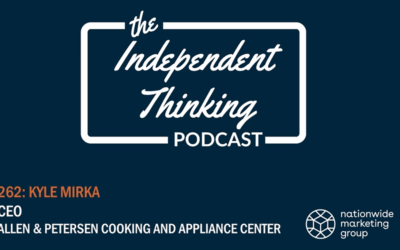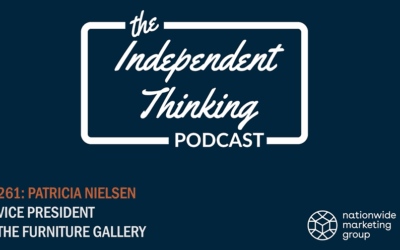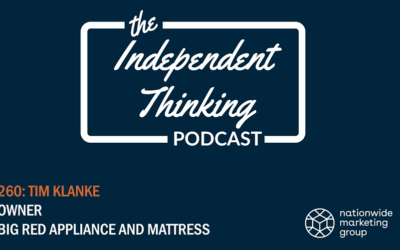There’s absolutely no denying that, within the past year, artificial intelligence (AI) tools — like the uber popular ChatGPT — have found a way to spread their roots into nearly every single industry. Retail is not exempt from that conversation by any means.
While the tools themselves have proven to be quite powerful (just look at this recent example of an AIgenerated photograph that fooled judges en route to a World Photography Organization award), they’re also uncovering some practical use cases that can make certain workflows more efficient.
Nationwide Marketing Group’s digital team is actively exploring ways tools like ChatGPT can be implemented into the day-to-day operations of independent retailers to save time and money. Independent Thinking recently sat down with Cyrille Aragon, director of digital strategy at Site on Time, to talk about AI and its present and future role in retail.
IT: The digital space has always been a fast-paced and constantly evolving arena. And now, we’re throwing artificial intelligence into the mix with tools like ChatGPT. Before we get into their impact, how would you describe these tools and services to the uninitiated?
CYRILLE ARAGON: The most popular one is the one you mentioned, right? ChatGPT. Which, funny enough, it only started blowing up in November of last year, but they’ve been working on that tool since 2015. So, good for that company for catching fire when they did.
When my team and I were first exploring this back in November, it was a cool thing that we would play with, and we didn’t really think too much of it, but we knew AI was on its way to being a thing. Fast-forward to now, and not only has ChatGPT had some updates and grown and evolved, but many, many, many AI tools have come out of this that go way beyond just the chatbot side. These are generally text prompt-based tools that allow the user to build images with text, build videos with text, anything you can imagine at this point. And really, the sky is the limit now. People are getting super creative in figuring out how we can use this new technology to make everything easier.
We’ve been hearing about AI for years, especially in the electronics and appliance industries. Look at what LG and Samsung have done with their appliances that have self-diagnosing features. So, AI is not new necessarily. But did AI find its key application and that’s why it exploded, or was there some sort of moment that you think resulted in this proliferation of all these different use cases right now?
It’s really hard to say. Yes, AI as a topic has been around for years, right? But it seemed like only a select few people were doing something with it or even had access to it. I think what’s cool with ChatGPT is that it’s free and anybody can use it. When I first discovered it, it was because on LinkedIn I follow a lot of digital marketers and SEO communities, and posts were going around about how it could use this tool to make your life easier. And I was like, “No way it can do that,” but I started trying it, and it’s like, “Oh wow, I guess it really can.” And then, of course, ChatGPT reaches national news and all these things. I think that really helped it tremendously, not only the tool itself, but AI in general. And now we live in this world of everything AI.
You mentioned all of the different possibilities and applications for these tools. From your seat, have you discovered the retail application for AI?
I think we’re close and we’re getting there. Using our operations as an example, and truly, this isn’t too integrated into our processes yet because I want to be very delicate with how we use it. But, as an example, we’ve found these tools to be a great way to cure writer’s block. So, rather than sitting in front of your paper or computer for 10 minutes trying to think about what you want to write, we’ve been able to throw a quick prompt into ChatGPT and see what it gives us, and then the gears will turn and we can go from there. Of course, while these tools can spit out some great content, it’s obviously not human. So, we’re still having to check for accuracy. But at the very least, it’s created some efficiencies there. We’ve done small tests here and there, and we’ve been able to make our writing times faster with articles and things like social media posts and ad copy. It serves as a great foundation.
That’s a great term: foundation. There’s, of course, been talk about the impact these tools might have on the workforce and eliminating jobs. But, to your point, there’s more to be done with whatever content AI generates. What other examples have you seen where retailers might be able to use AI as a foundation?
I think the use cases that could apply to retail the most, and not that I’ve necessarily seen it so far, but you can use ChatGPT to help with your market research. There are plug-ins within ChatGPT where you throw in a competitor’s URL and it does a complete competitive analysis of what is going on there. And then when it comes to general operations, you can have ChatGPT link to your email. It can help you write emails. So even if you don’t use it at a grand scale, that at least saves you a little bit of time as a retailer.
I was doing a bit of research recently on the different plugins that users like you and me have created in ChatGPT, and it is insane. With one click, you can write an entire book, you can do a video script, you can do code. If you can think it up, ChatGPT probably does it — or will do it soon enough.
Is there a need, then, for retailers to start thinking about an AI strategy for their business? And, if so, what does that even look like? Where do they start?
I would say the lowest hanging fruit when implementing this into your current business is to find ways to use it to just make everybody’s lives easier. When productivity is increased that means less costs and more margin, etc. But I would look operationally to see how you can use this technology, especially if you have an inhouse marketing team. They need to be the first ones exploring this tool and figuring out how they can make their lives easier.
A simple thing that I use it for is, OK, I know that there’s a certain persona in this market where it’s like, grandmas just really love to buy these refrigerators, and I need ad copy to be able to write to them. I’m not the most creative person. I’ll know if it looks good and it’s hitting the point, but if I can have a little help generating that content for me, that saves a ton of time.
And then on a broader scale, which is something that I’ve put on my plate for the entire membership, when they’re thinking about their marketing strategies, how can we use this tool to help with either keeping their competitors at bay or just winning more market share, anything like that? That’s something that I’ve been stewing on recently. I’m hoping to have better answers there in the future. But yeah, it’s a big focus right now.
A conversation around this wouldn’t be complete if we didn’t at least talk about some risks, right? Have you thought about that at all, and what can be done to address any concerns a retailer might have?
The first thing that comes to mind is the risk of plagiarism. Even I don’t know how the backend of this thing works, and I think most people wouldn’t, but they’ve got to scrape this information somehow. At the very least, this AI model is learning from everybody’s information that’s already out there. So, if I ask it to write a blog about Phish, I’m sure everybody else’s Phish articles are being scraped and molded and doing something, and maybe it might spit out something that’s very similar to somebody else’s. Another risk is, is the information it provides correct? Even ChatGPT itself acknowledges, “Hey, the accuracy is at this level. Always check. We’re not liable.”
And there are stories out there that people have used this tool for wrong. Right now, we’re talking about ChatGPT from a business standpoint, but people have tried to use it to help them with hacking and spreading misinformation and all other kinds of stuff. And so, there’s that risk. It’s just a totally new frontier for everybody, and I don’t think anybody’s an expert at it quite yet.
Really unique stuff and an ever-changing industry for sure. I know we’ll be excited to continue following not only development of the tool itself, but how your team uses it and where it can fit into our retailers’ strategies as they look to implement these things.
For sure. Yeah, let us tinker around here on the digital side of things and let’s see in a few months where we’re at.




